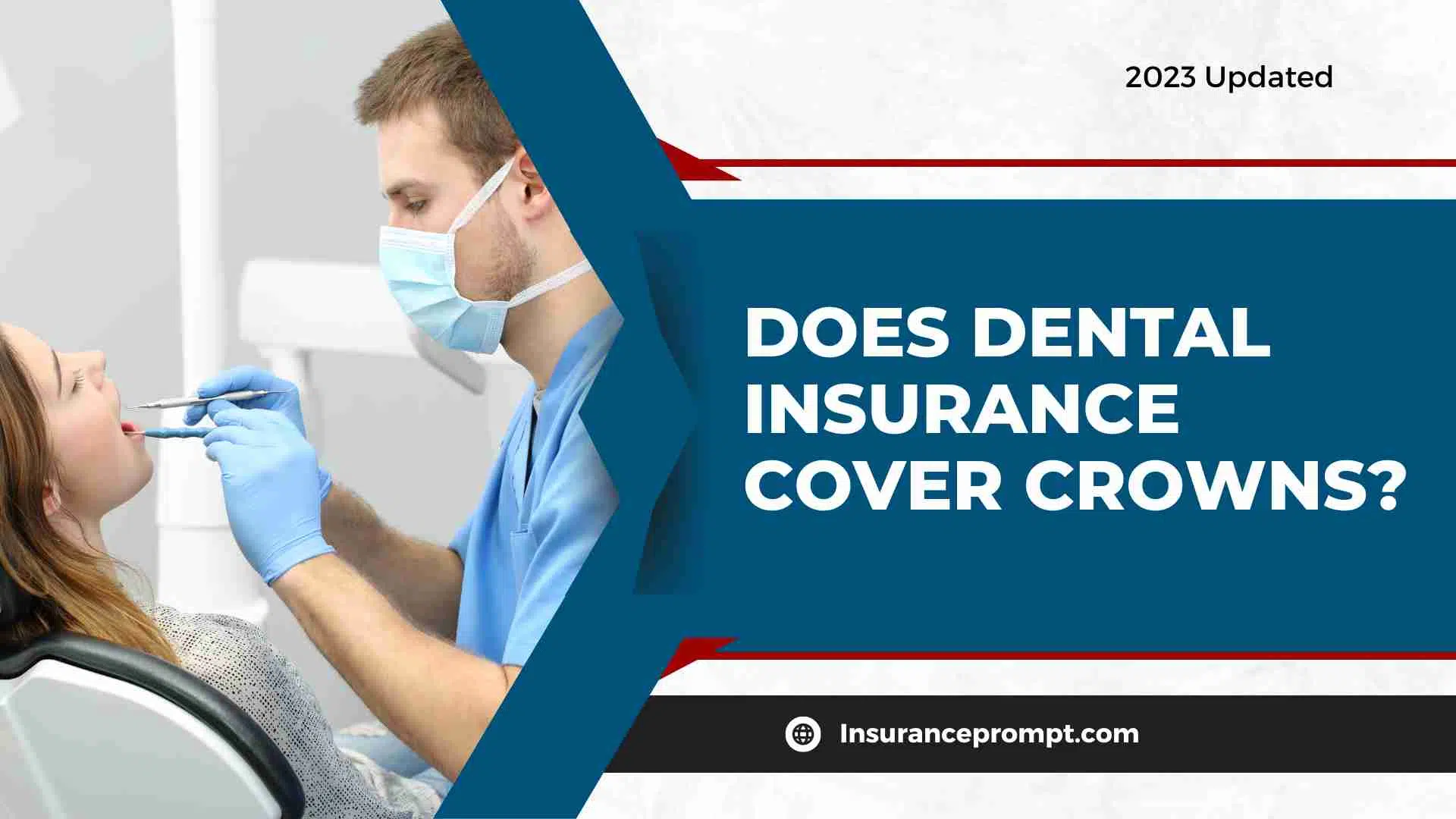Introduction
Does Dental Insurance Cover Crowns? Dental crowns are a common yet crucial treatment for restoring damaged or decayed teeth, but many patients wonder if their dental insurance will cover this essential procedure.
In this blog post, we’ll dive into the different types of dental insurance plans and discuss whether they typically provide coverage for dental crowns. We’ll also explore some alternative financing options to help ease the financial burden of this vital dental care service.
Key Takeaways
- Dental crowns are custom-made caps that cover damaged or decayed teeth to restore their strength, shape, and appearance.
- The cost of dental crowns can vary depending on the material used, the location of the tooth, and the dentist’s experience. Patients can expect to pay between $1,000 and $1,500 per crown.
- Indemnity dental insurance plans typically cover a portion of the cost of crown procedures after you meet your deductible. PPO plans may also provide coverage for crown treatment but may have limitations or waiting periods. Working closely with your dentist and verifying your specific plan before undergoing any procedure is essential.
Table of Contents
Understanding Dental Crowns
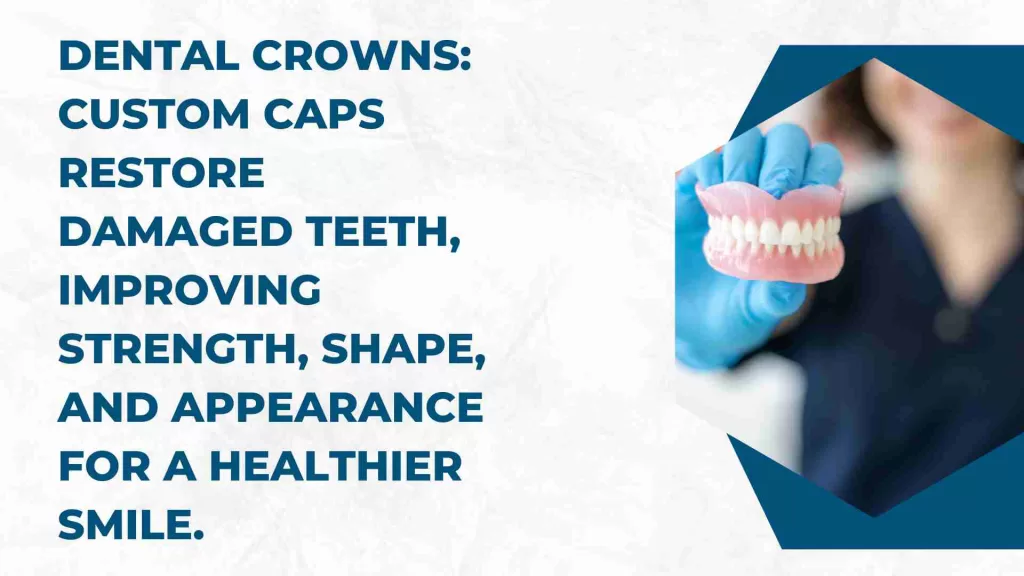
Dental crowns are custom-made caps that cover damaged or decayed teeth to restore their strength, shape, and appearance.
Definition Of Dental Crowns
Dental crowns, or caps, are custom-made restorations designed to cover and protect a damaged or weakened tooth. These permanent solutions restore the aesthetics of your smile and help improve functionality when eating and speaking.
Getting a dental crown involves the dentist removing any decayed or damaged material from the tooth, reshaping it to fit the crown precisely, and then securely cementing the cap.
This procedure is typically necessary when a tooth has been severely damaged by decay or injury, when there’s significant wear due to teeth grinding (bruxism) or as part of certain dental treatments such as root canals and dental implants.
Types Of Dental Crowns
Dental crowns are essential to maintaining good dental health and can be made from various materials to suit individual needs. Consider the following types of dental crowns when discussing options with your dentist:
- Porcelain Crowns: These crowns are popular for their natural appearance and ability to blend in seamlessly with your existing teeth. They are ideal for front teeth but may not be as durable as other materials.
- Ceramic Crowns: Similar to porcelain, ceramic crowns have a natural appearance and are strong enough for front and back teeth.
- Porcelain-Fused-to-Metal (PFM) Crowns: These crowns combine the strength of metal with the aesthetic appeal of porcelain. However, they may cause wear on opposing teeth and can sometimes reveal a dark line at the gumline.
- Gold Alloy Crowns: Known for their durability and strength, gold crowns require less removal of natural tooth structure but may not be as visually appealing or suitable for all patients.
- Base Metal Alloy Crowns: These non-noble metal crowns offer great resistance to corrosion and fracture while requiring minimal removal of tooth structure but may not have the same aesthetic value as porcelain or ceramic options.
Considering factors like aesthetics, durability, cost, and insurance coverage is crucial when choosing the right type of dental crown for your needs.
The Cost Of Dental Crowns
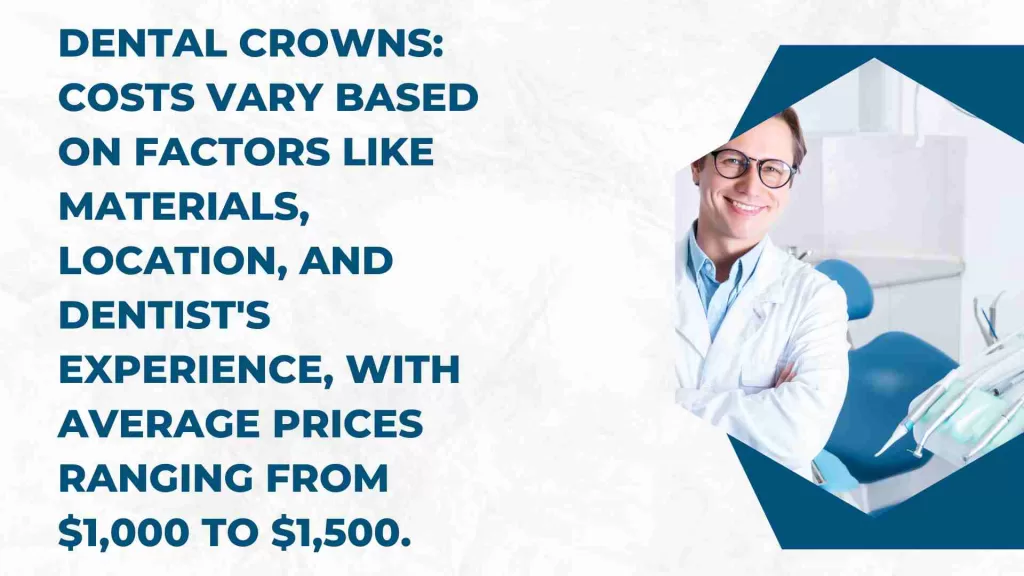
The cost of dental crowns can vary depending on several factors, including the material used, the location of the tooth, and the dentist’s experience.
Factors Affecting The Cost Of Dental Crowns
Several factors can influence the cost of dental crowns, making the process of budgeting for this important dental procedure a bit more complicated. Here are some key factors to consider:
- Material Used: The type of material used for the crown significantly impacts its price. Porcelain and ceramic crowns appear the most natural but can be more expensive, while metal crowns tend to be more affordable but less aesthetically pleasing.
- Geographic Location: Prices for dental procedures often vary depending on where you live, with urban areas having higher costs than rural regions.
- Dentist’s Experience and Skill: Highly skilled and experienced dentists may charge more for their services because they offer better workmanship.
- Dental Lab Fees: If your dentist uses an outside lab to create the crown, lab fees will be added to your overall cost.
- The complexity of the Procedure: If additional dental work is needed before placing the crown, such as a root canal or bone grafting, those costs will also contribute to the final price.
- Dental Insurance Coverage: Your insurance policy can significantly determine how much you’ll pay out-of-pocket for your crown by influencing which materials are covered and whether there’s a waiting period or deductible involved.
- Condition of Tooth: Severely damaged teeth may require extensive preparation and treatment before receiving a crown, resulting in higher costs.
It’s important to weigh these factors when estimating the cost of dental crowns, so you can make informed decisions about your dental care that align with your needs and budget.
Average Cost Of Dental Crowns
The cost of dental crowns can vary depending on the type of material used, with porcelain and ceramic crowns usually costing more than metal or resin options.
Patients can expect to pay between $1,000 and $1,500 per crown. However, it’s important to note that additional procedures may be required before the crown installation, such as a root canal or an extraction.
These extra procedures can add to the overall cost of treatment.
Types Of Dental Insurance Plans
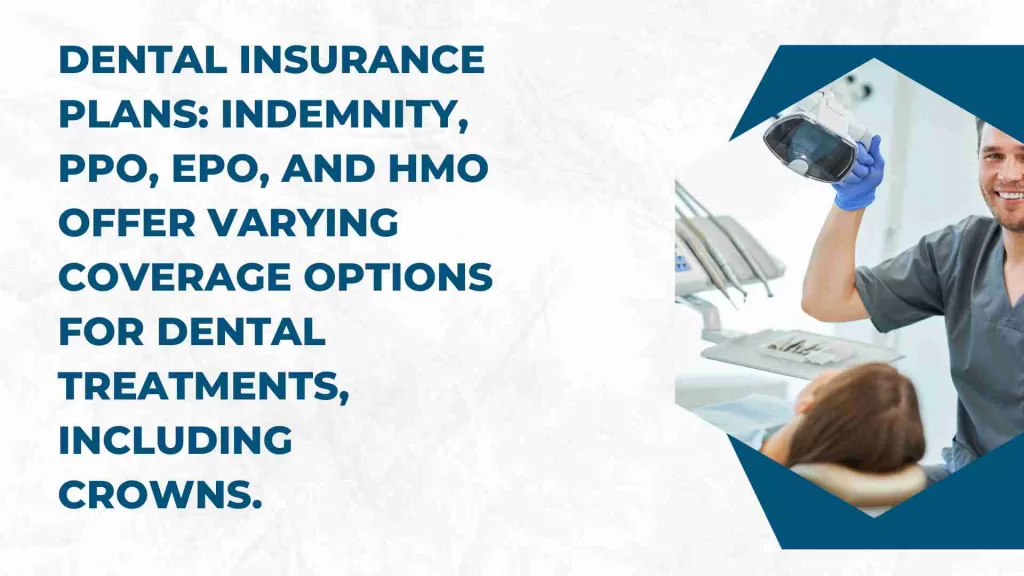
There are four main types of dental insurance plans: indemnity dental insurance, preferred provider organizations (PPO), exclusive provider organizations (EPO), and health maintenance organizations (HMO).
Indemnity Dental Insurance
With indemnity dental insurance, you can choose your dentist without being limited to a specific network. This type of plan is sometimes called “traditional” insurance and reimburses a portion of covered dental expenses.
The insurance company pays claims based on the procedures performed under a dental indemnity plan. As an insured consumer, you pay dentists directly for services rendered and later receive compensation from the insurance company.
While most dental plans cover preventative care, some may also cover certain basic and major services such as crowns.
Preferred Provider Organizations (PPO)
As a Crown Treatment Seeker, you may want to consider a Preferred Provider Organization (PPO) dental insurance plan. These plans allow patients to choose their dentist and receive care at a lower out-of-pocket cost than other plans.
PPOs typically cover preventive care and basic services, like cleanings and X-rays, with additional coverage options for restorative procedures, like crowns.
With a PPO plan, you can get the treatment you need without breaking the bank or sacrificing your choice of provider. Plus, many insurers provide online resources such as FAQs and customizable search tools, making finding in-network providers near you easy.
Exclusive Provider Organizations (EPO)
As a Crown Treatment Seeker, it’s essential to understand different types of dental insurance plans. An Exclusive Provider Organization (EPO) is a network that offers reduced costs for participating dentists’ services.
EPO plans only cover in-network PPO dentists and doesn’t include out-of-network expenses.
It’s important to check if your preferred dental specialist falls under the EPO plan coverage before settling for it. Some people opt for EPO plans because they provide affordable access to treatments related to health and dental insurance, like PPOs and HMOs.
Health Maintenance Organizations (HMOs)
If you want dental insurance coverage for your crown treatment, you may want to consider enrolling in a Health Maintenance Organization (HMO) plan. HMOs are managed care plans that typically offer lower out-of-pocket costs and more comprehensive coverage than other plans.
With an HMO, you’ll generally pay a fixed monthly premium and have access to a network of providers who have agreed to offer services at discounted rates.
Most HMOs cover major restorative care, including crowns, bridges, dentures, and oral surgery up to a certain amount.
Does Your Dental Insurance Plan Cover Crowns?
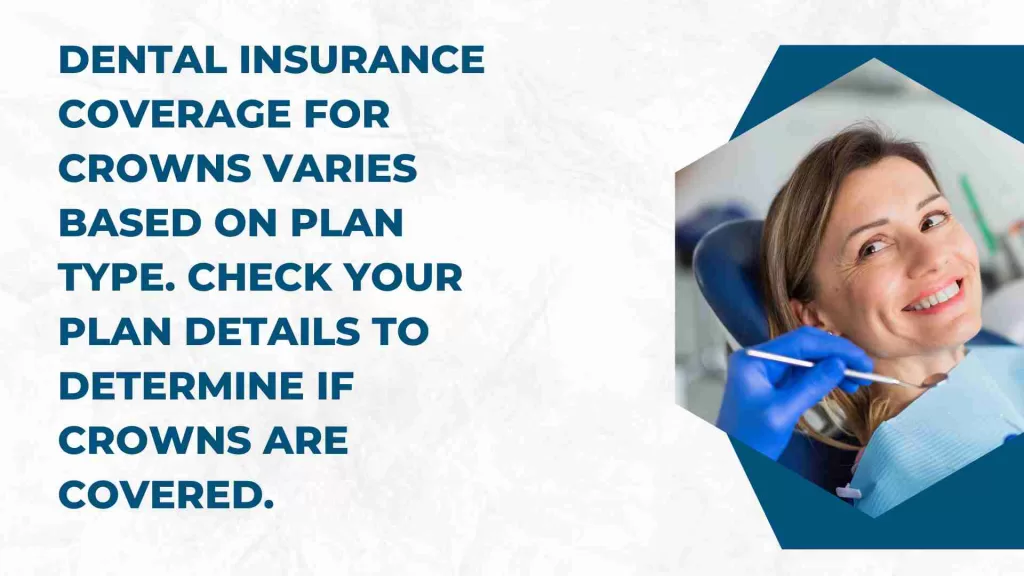
Find out if your dental insurance plan covers crowns before scheduling a procedure.
Coverage For Dental Crowns Under Indemnity Dental Insurance
If you have indemnity dental insurance, you can usually get coverage for crown procedures. Indemnity plans are called “fee-for-service” because they allow patients to choose any dentist and pay them directly for services.
For example, let’s say your dentist charges $1,000 for a crown procedure, and your insurance covers 50% of the fees after meeting your $500 deductible. That means you’ll be responsible for paying $500 out-of-pocket before your coverage kicks in.
Coverage For Dental Crowns Under PPOs
If you have a PPO dental insurance plan, coverage for dental crowns can vary depending on your specific plan. Generally, most PPO plans cover a portion of the cost of necessary crown treatment.
However, it’s important to note that this coverage may have limitations and exclusions.
To get the most out of your PPO dental insurance plan regarding crowns, it’s essential to understand what your plan covers and how much they will pay for the procedure.
Some popular companies, such as Delta Dental and MetLife, offer comprehensive plans that include crown coverage with no waiting period.
Coverage For Dental Crowns Under EPOs
If you have an Exclusive Provider Organization (EPO) dental insurance plan, your coverage for dental crowns may be limited to only certain dentists within the network.
EPO plans typically do not cover out-of-network services, meaning that if you see a dentist not a part of your plan’s network, you may have to pay the full cost of the crown procedure.
However, if you choose a provider within your plan’s network, you could receive discounts on the treatment costs or even full coverage depending on your specific policy and plan benefits.
Coverage For Dental Crowns Under HMOs
If you have an HMO dental plan, crown coverage may be limited. HMO plans typically offer basic dental care services and only cover major restorative procedures like crowns when deemed medically necessary.
This means deciding to cover a crown may depend on the dentist’s judgment and your unique dental situation. It’s important to carefully review your HMO dental plan benefits before undergoing any major dental procedure, including getting a crown.
Limitations And Exclusions Of Dental Insurance Coverage For Crowns
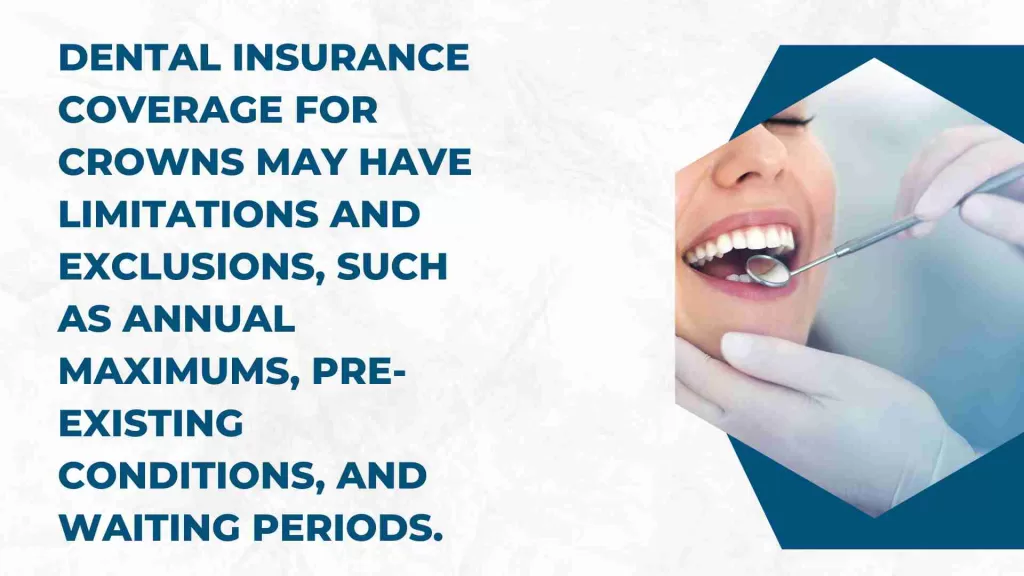
Annual maximums, pre-existing conditions, waiting periods, and dental insurance exclusions can all limit or exclude coverage for dental crowns under certain insurance plans.
Annual Maximums
As someone looking to get a dental crown, it’s important to understand the limitations of your dental insurance plan. One key aspect is the annual maximum, the maximum amount your plan will cover for procedures in a given year.
Typically, this cap ranges from $1000 – $1500 per person per year and is reset at the end of each benefit period (usually 12 months). However, it’s important to note that this cap only covers procedures related strictly to health and wellness, such as crown-related procedures.
Any expenses beyond that amount are typically the responsibility of the patient.
Pre-existing Conditions
A pre-existing condition can limit or exclude dental insurance coverage for crowns. For instance, if you have missing teeth or tooth decay before signing up for dental insurance, it may not cover the crown needed to fix your problem.
Some dental benefit plans have restrictions such as annual maximums and managed care cost containment. Obtaining a dental insurance plan with no exclusions for pre-existing conditions is vital if you require coverage for your crown treatment.
Waiting Periods
I understand that waiting periods for dental insurance coverage can be frustrating, especially when you need a crown. It’s important to know that most dental insurance plans have waiting periods for major services like crowns, bridges, and dentures.
For example, some plans may require a 6-month wait for basic services and up to 12 or even 24 months for major work. You may need to pay out of pocket until your waiting period ends.
However, it is possible to find dental insurance plans that offer no waiting period coverage for major services like crowns.
Dental Insurance Exclusions
It’s important to know the limitations and exclusions in dental insurance coverage for crowns. For instance, many policies have annual maximums that limit how much they will pay toward your dental care each year.
Pre-existing conditions may also be excluded from coverage, meaning you may not be covered if you need a crown because of an existing dental problem.
Additionally, some insurance plans may not cover certain materials used for crowns. For example, ceramic or porcelain crowns often appear the most natural but can come at a higher cost than metal ones.
Alternative Financing Options For Dental Crowns
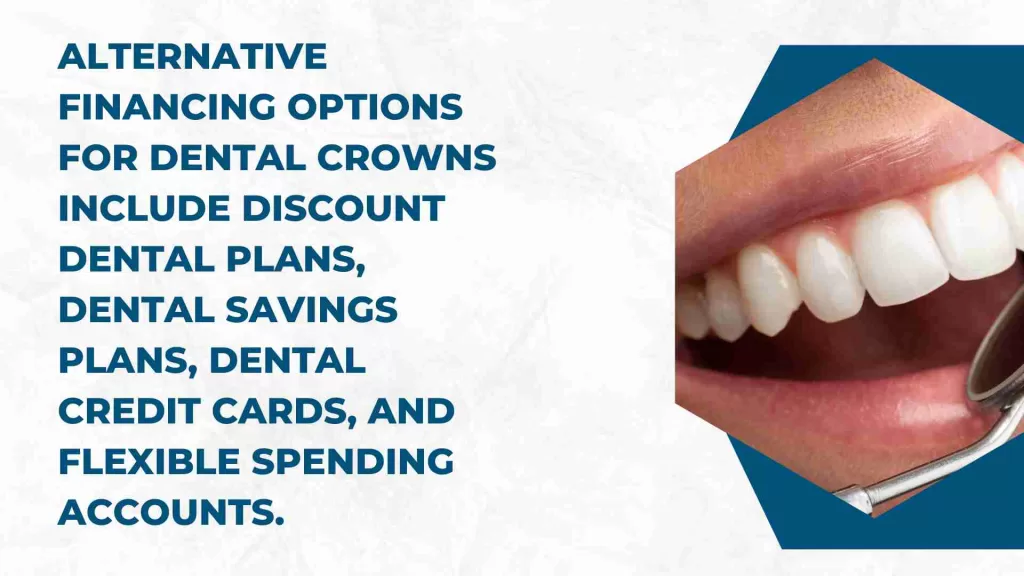
If you’re concerned about the cost of dental crowns, don’t worry – alternative financing options are available.
Discount Dental Plans
I highly recommend looking into discount dental plans if you’re seeking alternative financing options for dental crowns. Here are some key points to keep in mind:
- Discount dental plans offer savings on a wide range of dental services, including crown treatments.
- These plans typically have a low annual fee and can provide significant discounts on the cost of crowns.
- Unlike traditional insurance, discount dental plans have no waiting periods or deductibles.
- Some plans offer additional benefits, such as free exams or discounted orthodontic treatments.
- Researching different discount dental plan options and comparing prices and benefits before signing up is important.
Remember, one in four Americans don’t have dental insurance, but that doesn’t mean you’re out of luck when affording necessary dental procedures like crowns. Discount dental plans can be a great option for those seeking affordable and accessible oral healthcare.
Dental Savings Plans
As someone seeking crown treatment, I understand dental procedures can be expensive. In addition to traditional dental insurance, a dental savings plan is another option. Here are some facts about dental savings plans:
- Dental savings plans are membership programs that offer discounted rates for dental services.
- Unlike insurance, there are no deductibles or annual maximums with a dental savings plan.
- These plans typically have low monthly fees and offer discounts on various services, including crowns.
- Savings can range from 10% to 60% off the standard cost of a crown procedure.
- Some dental savings plans also offer discounts on cosmetic dentistry services if you’re interested in improving the appearance of your smile.
- It’s important to note that these plans are not insurance and therefore do not cover any portion of the costs associated with crown treatment. However, they can provide significant savings on out-of-pocket expenses.
By considering a dental savings plan as an alternative or supplement to traditional insurance coverage, you may be able to reduce the overall cost of your crown procedure without sacrificing quality care.
Dental Credit Cards
As someone considering getting a dental crown, it’s important to explore alternative financing options in case your insurance coverage falls short. Here are some key facts about dental credit cards to help you make informed decisions:
- CareCredit is one of the most popular healthcare credit cards out there. It can be used for various medical and dental needs, including crowns, and offers special financing options with low or no interest rates depending on your payment plan.
- Other dental-specific credit cards include the Wells Fargo Health Advantage Card and the Citi Health Card, which offer flexible repayment options. Be sure to research each card’s terms and conditions carefully before applying.
- Before deciding on a dental credit card, check with your dentist’s office to see if they offer in-house financing plans or partnerships with specific credit card companies. Some providers may offer their own loyalty or rewards programs as well.
- While dental credit cards can help cover the upfront cost of a crown procedure, interest rates, and fees can add up quickly if you don’t pay off your balance within the promotional period. Make sure you budget accordingly and have a plan for repaying any debt incurred.
- If you have bad credit or cannot qualify for traditional financing options, consider exploring alternative financial solutions such as SimplePay Dental Financing. This program offers affordable monthly payments with no credit checks required.
Remember, getting a dental crown is an investment in your oral health. By exploring all available financing options, you can ensure that cost isn’t a barrier to getting the care you need.
Flexible Spending Accounts (FSAs)
As a Crown Treatment Seeker, it’s important to consider all options for covering the cost of dental procedures. One option is utilizing a Flexible Spending Account (FSA). Here are some important facts to know about FSAs:
- FSAs allow employees to use pre-tax dollars to pay for dental services, including crowns, which dental insurance may not cover.
- Eligible expenses for FSAs include dental treatments such as X-rays, fillings, extractions, dentures, caps, crowns, fluoride treatments, implants, and non-cosmetic procedures.
- FSAs do not cover cosmetic dentistry procedures.
- Health savings accounts (HSAs) can also cover dental expenses that insurance may not cover.
- Patients should check the eligibility of their FSA or HSA before scheduling a dental procedure.
By utilizing an FSA or HSA in addition to dental insurance coverage, Crown Treatment Seekers can better plan and prepare for the cost of necessary dental procedures.
The Importance Of Pre-Authorization For Crown Coverage
Before scheduling a crown procedure, obtaining pre-authorization from your dental insurance provider is crucial to ensure that the procedure will be covered and you won’t be left with unexpected costs.
The Process Of Pre-Authorization
As a Crown Treatment Seeker, it’s important to understand the pre-authorization process before undergoing crown placement. Here are the steps involved:
- Schedule an appointment with your dentist for a consultation and examination of the tooth.
- Your dentist will submit a request for pre-authorization to your dental insurance provider, including details such as the reason for the crown placement, type of crown, and estimated cost.
- The insurance provider will review the request and determine whether your plan covers the treatment and how much it will cover.
- You may receive written approval or denial of coverage from your insurance provider within a few days.
- If approved, you can schedule an appointment with your dentist to proceed with the crown placement. Remember that pre-authorization is not a guarantee of payment; your insurance provider may deny coverage later on if they determine that the treatment was not medically necessary or if you have already reached your coverage limits.
The Benefits Of Pre-Authorization
Before undergoing any dental procedure, knowing if your insurance plan will cover it is essential. That’s where pre-authorization comes in. Pre-authorization provides written approval for a planned dental service based on eligibility and remaining benefits.
For example, if your dentist recommends crown placement, pre-authorization will determine the coverage offered by your insurance plan. This process usually takes ten business days and is usually valid for up to 60 days.
By obtaining pre-approval beforehand, you can decide what type of treatment to get and how much you will have to pay out of pocket.
Maximizing Dental Insurance Coverage For Crowns

Understand your dental insurance plan benefits and limitations to ensure that you get the most out of your coverage when it comes to crowns, choose an in-network provider, and time your treatment appropriately.
Understanding Plan Benefits
As someone looking to get a dental crown, it’s important to understand the benefits of your dental insurance plan. Here are some things you should know:
- Your plan may cover a portion of the cost of the crown installation/replacement procedure.
- The coverage amount may depend on the reason for needing the crowns (e.g., restorative vs. cosmetic).
- Some plans may have annual maximums on their coverage for major procedures like crown installations.
- It’s important to choose the right dentist who is in-network with your plan to maximize your benefits and reduce out-of-pocket costs.
- Timing is also important as some plans have waiting periods before they cover major restorative procedures like crowns. Be sure to check when coverage kicks in and plan accordingly.
- You should also know any deductibles or co-payments that might apply to your crown procedure.
By understanding your plan benefits, you can make informed decisions about getting a dental crown that works best for your oral health needs and financial situation.
Choosing The Right Dentist
Choosing the right dentist can make a big difference in maximizing dental insurance coverage for crowns. Look for a dentist who is experienced in restorative dentistry and accepts your insurance plan.
It is also important to choose a dentist whose office offers flexible financing options, such as payment plans or third-party financing if you need help covering the cost of treatment that isn’t covered by insurance.
Don’t be afraid to ask questions and research before scheduling an appointment to ensure you get the best dental care possible while maximizing your insurance benefits.
Timing Your Treatment
It’s important to consider the timing of your crown treatment regarding your dental insurance coverage. Many plans have waiting periods before major restorative procedures like crowns are covered, so you’ll want to plan accordingly.
Another consideration is ensuring that any pre-authorization requirements are met before starting treatment. This process can take some time, but it’s worth ensuring that your insurance will cover the cost of the crown or at least provide some assistance with the expense.
FAQs:
Does dental insurance usually cover the cost of crowns?
The coverage for dental crowns varies depending on your plan and insurer, but most plans offer at least partial coverage for this type of procedure. It’s important to verify what is specifically covered by your plan before scheduling any treatments.
How much can I expect my dental insurance to pay for a crown?
Dental insurance typically covers about 50% – 80% of the cost associated with a crown, depending on whether it is considered medically necessary or cosmetic.
What types of crowns are typically covered by dental insurance?
Most traditional types of dental crowns (such as gold, porcelain-fused-to-metal, and ceramic options) are generally covered under most standard dental plans.
Are there instances when my insurance may not cover a crown?
Dental insurers may refuse to pay for certain procedures if they deem them unnecessary or purely cosmetic. So it’s essential to ensure you understand your specific policy’s limitations accurately before proceeding with any treatment plans involving crowns or other expensive restorative dentistry methods that might trigger objections from insurers who review claims for reimbursement purposes.
Conclusion: Making Informed Decisions About Dental Crown Coverage
In conclusion, The question of Does Dental Insurance Cover Crowns? really matters nowadays. Obtaining dental insurance can help cover the cost of many critical dental services, including crowns. However, it is crucial to understand that crown coverage may vary depending on your plan type and whether or not the crown is deemed medically necessary.
Deductibles may apply, and waiting periods may be required before coverage. To make informed decisions about dental crown coverage, working closely with your dentist and verifying what your specific plan covers is essential.
Reference Lists
https://www.humana.com/dental-insurance/dental-resources/dental-crown-costs-coverage
https://www.investopedia.com/ask/answers/113015/does-dental-insurance-cover-crowns.asp
https://www.animated-teeth.com/dental_crowns/blog-dental-insurance-for-crowns.htm
https://www.insurancecompany.com/dental-insurance-articles/dental-insurance-for-crowns.html
https://healthysmilesscv.com/does-dental-insurance-cover-porcelain-crowns
https://www.bcbsfepdental.com/crownTypes
https://www.byte.com/community/resources/article/cost-of-crowns/
- Does M&S Do Car Insurance? A Full Guide In 2024 - April 15, 2024
- Pet Insurance for Older Dogs: 2024 Full Guide & Top Providers - March 17, 2024
- Small Business Equipment Breakdown Insurance: Full Coverage - November 6, 2023

